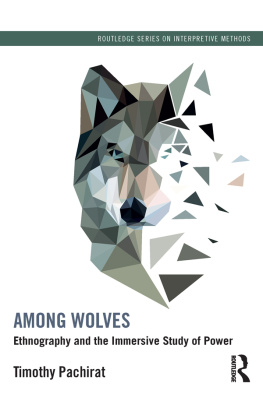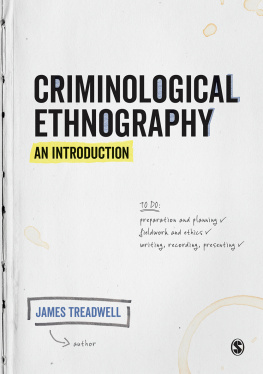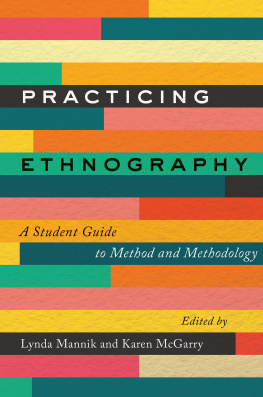Among Wolves is both masterclass and manifesto for how ethnography generates insightsinto the operation of power as well as providing a thoughtful exploration of the politics ofethnographic methods. Pachirat is to be congratulated on creating a vivid, evocative andaccessible text that will compel readers to laugh, sigh, frown andmost frequentlypauseto reflect and think. The books multidisciplinary cast of ethnographers adroitly guide thereader through debates, dilemmas and decisions, and there is a reference, comment or ideato bookmark and explore further on almost every page. This deceptively slim and readablebook insistently demands that we engage actively with the praxis of ethnography and willrichly reward repeated readings and discussions whether in the classroom, the field, or whereverelse we find ourselves contemplating how to understand peoples experiences of thesocio-political world.
Cai Wilkinson, Associate Head of School of Humanities and
Social Sciences, Deakin University
With its bold format, Timothy Pachirats Among Wolves is an intellectual and pedagogicaldelight. Inserting readers into lively intellectual debates that defy easy answers, it challengesus all to improve our selfknowledge as we embark on ethnographic journeys. Embracingcomplexity, nuance, immersion, and personal engagementall the hallmarks of top ethnographicworkPachirat packs dozens of insights into every page. Students and practitionersof ethnography, not to mention non-ethnographers curious about the craft, will love thisbook.
Edward Schatz, Professor and Chair of the Political Science Department,
University of Toronto (Mississauga)
Such a refreshing contrast to standard texts on ethnography. This book is a joy to read. Theunique writing style draws one in surprisingly quickly and makes the book hard to lay aside.In re-creating a conversation between a handful of particularly accomplished contemporaryethnographers, Pachirat has provided us with a highly original, user-friendly, exploration ofthe (oftentimes painfully personal) challenges of doing fieldwork.
Mark de Rond, Professor of Organisational Ethnography, University of Cambridge
While methods books may be a necessary tool, especially for students, they are often boring.Timothy Pachirats volume revolutionizes the genre, and the result is absolutely refreshingand convincing. Imagine a play where all the major methodological and theoretical issuesraised by ethnography are discussed by a prosecutor arriving on a Harley Davidson to meetwith a group of well-known ethnographers in the presence of a Wolfdog! This book will beon the list of required readings for my graduate seminar on ethnographic methods.
Martina Avanza, Universit de Lausanne and co-director of EthnoPol
In Among Wolves Timothy Pachirat sketches some of the practical intricacies of doing ethnographyand touches upon the philosophical challenges and theoretical underpinnings ofthinking ethnographically. Written as a play, the book offers an unusually dramatic account ofethnographys pros and cons. While its dialogical style allows for debate by bringing togetherdifferent, sometimes competing views, the creative structure of the book takes off some ofthe heat that such debates tend to generate. This allows the reader to approach some of ethnographyshighflying and down-to-earth questions in a light and lucid style. A fantabulousbook for both experienced and less-experienced ethnographers.
Sierk Ybema, Vrije Universiteit Amsterdam and Anglia Ruskin University
AMONG WOLVES
Summoned by an anonymous Prosecutor, ten contemporary ethnographersgather in an aging barn to hold a trial of Alice Goffmans controversial ethnography,On the Run. But before the trial can get underway, a one-eyed wolfdog arriveswith a mysterious liquid potion capable of rendering the ethnographers invisiblein their fieldsites.
Presented as a play that unfolds in seven acts, the ensuing drama providesreaders with both a practical guide for how to conduct immersive participantobservationresearch and a sophisticated theoretical engagement with the relationshipbetween ethnography as a research method and the operation of power.By interpolating how-to aspects of ethnographic research with deeper questionsabout ethnographys relationship to power, this book presents a compellingintroduction for those new to ethnography and rich theoretical insights for moreseasoned ethnographic practitioners from across the social sciences. Just as ethnographyas a research method depends crucially on serendipity, surprise, andan openness to ambiguity, the books dramatic and dialogic format encouragesnovices and experts alike to approach the study of power in ways that resist linearprograms and dogmatic prescriptions. The result is a playful yet provocative invitationto rekindle those foundational senses of wonder and generative uncertaintythat are all too often excluded from conversations about the methodologies andmethods we bring to the study of the social world.
Timothy Pachirat is Assistant Professor of Political Science at the University ofMassachusetts at Amherst and author of Every Twelve Seconds: Industrialized Slaughterand the Politics of Sight (Yale University Press, 2011).
Routledge Series on Interpretive Methods
Edited by:
Dvora Yanow, Wageningen University, The Netherlands Peregrine Schwartz-Shea, University of Utah, US
The Routledge Series on Interpretive Methods comprises a collection of slim volumes,each devoted to different issues in interpretive methodology and its associatedmethods. The topics covered establish the methodological grounding for interpretiveapproaches in ways that distinguish interpretive methods from quantitativeand qualitative methods in the positivist tradition. The series as a wholeengages three types of concerns: 1) methodological issues, looking at key conceptsand processes; 2) approaches and methods, looking at how interpretive methodologiesare manifested in different forms of research; and 3) disciplinary and subfieldareas, demonstrating how interpretive methods figure in different fields across thesocial sciences.
Interpretive Research Design: Concepts and Processes
Peregrine Schwartz-Shea and Dvora Yanow
Interpreting International Politics
Cecelia Lynch
Analyzing Social Narratives
Shaul R. Shenhav
Elucidating Social Science Concepts: An Interpretivist Guide
Frederic Charles Schaffer
Relational Interviewing for Social Science Research: An Interpretive Approach
Lee Ann Fujii
Among Wolves: Ethnography and the Immersive Study of Power
Timothy Pachirat
International Advisory Board
Michael Agar
University of Maryland,
College Park (emeritus) and
Ethknoworks LLC, Santa Fe, NM
Mark Bevir
University of California, Berkeley
Pamela Brandwein
University of Michigan
Kevin Bruyneel
Babson College
Katherine Cramer
University of Wisconsin, Madison
Douglas C. Dow
University of Texas, Dallas
Vincent Dubois
University of Strasbourg
Raymond Duvall
University of Minnesota
Martha S. Feldman
University of California, Irvine
Lene Hansen
University of Copenhagen
Victoria Hattam
The New School
Emily Hauptmann
Western Michigan University
Markus Haverland
Erasmus University, Rotterdam








